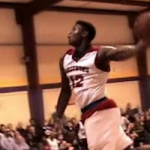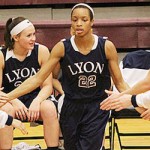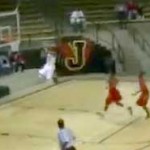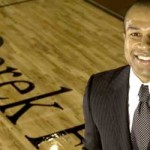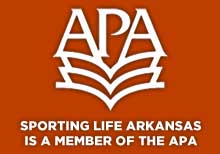 Mid-South Community College at West Memphis sits just a few miles from the Mississippi River. The two-year institution of higher education serves some of this state’s poorest counties.
Mid-South Community College at West Memphis sits just a few miles from the Mississippi River. The two-year institution of higher education serves some of this state’s poorest counties.
Mid-South, despite a generally low media profile, received international attention last week when the school flipped the switch on an online feed of the once-famous Delta radio station KWEM.
“It takes little prodding to draw stories from Larry Manuel about how, before they were the subjects of films and supernatural sightings, Johnny Cash and Elvis Presley were just two musicians trying to make it along the Mississippi River,” Alan Blinder wrote in The New York Times earlier this week. “Mr. Manuel, 75, is not a historian. He remembers the two men well because they, as he did, hung around a radio station that, before its 13-year run ended in 1960, carried the call letters KWEM and is now credited with helping to ignite the careers of some of this region’s musical greats, including B.B. King, Howlin’ Wolf and Elmore James. But KWEM’s hiatus has ended, perhaps for good. Last week, the largely forgotten station resumed broadcasting as part of a revival effort led by a local community college.”
Southern music historian Peter Guralnick told the newspaper, “KWEM played a real role at a time when radio was providing not just entertainment but an impetus toward a musical revolution.”
The KWEM online feed is available 24 hours a day, playing a mixture of country, rock and blues music. It’s another of the brainchildren of Mid-South’s dynamic president, Glen Fenter, who has a passion for the Delta despite the fact that he grew up in far western Arkansas at Charleston. Fenter, a Hendrix College graduate, was a teacher and coach at Alma High School, an assistant principal at Fort Smith Northside High School and a principal at West Memphis High School before making the move in 1992 to higher education.
In addition to an online radio station, the school also has a men’s and women’s basketball program. Not just any program, mind you, but one that ranks first in basketball attendance in Division II of the National Junior College Athletic Association. There are more than 125 Division II teams that report their figures to the NJCAA.
“Our program has also outdrawn all but a handful of the NJCAA Division I schools,” Fenter says. “I don’t care who you are, that’s pretty cool.”
Fenter views the program as being about more than basketball.
“I’m a strong proponent of intercollegiate athletics and what that opportunity can mean to the young men and women of our region,” he says. “Leadership skills, teamwork and character development are all natural outgrowths of a sports program created for all the right reasons. Our men’s team, for example, spent time this past season practicing with a local Cub Scout pack. Under normal circumstances that would be a pretty big deal to kids interested in basketball. It’s not every day that a youngster gets a chance to take the floor with college players who tower over him. In this instance, however, there was more to the story than just an unforgettable event for a group of kids.
“The father of one of the youngsters wrote us a thank-you note after the practice. He told us that he wanted to share how much his son had enjoyed the time on the floor with our young men. He went on to say that his son was diagnosed with autism at age 4 and deals with the challenges related to transitions and schedule deviations. On this particular day, the 7-year-old boy had no such difficulties. His father told us that his son has tried a variety of sports but has shown interest only in basketball.”
The MSCC men’s and women’s teams make regular visits to the Ronald McDonald House across the Mississippi River in Memphis, where the players volunteer as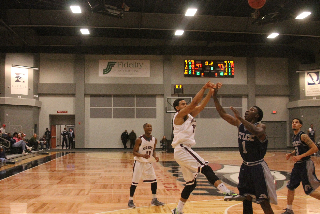 cooks and servers for those being treated at St. Jude Children’s Research Hospital. They also serve the family members staying at the Ronald McDonald House, which is a home away from home for families while children are treated for cancer and other illnesses.
cooks and servers for those being treated at St. Jude Children’s Research Hospital. They also serve the family members staying at the Ronald McDonald House, which is a home away from home for families while children are treated for cancer and other illnesses.
“On one of those visits, a couple of youngsters bonded with the men’s team and stayed after the meal to play with them,” Fenter says. “Unbeknownst to the players, one of the kids, a 5-year-old boy, had been placed in hospice care and was not expected to live much longer. As one of the players recalled, ‘They were playing like they were going to live forever. One of them had been diagnosed with something that only gave him a couple of more weeks to live, but you couldn’t tell by his attitude. He was playful and happy.’
“Our players learned a great deal that day, but they also made an impact on that boy and his family. Our basketball program may never produce a national championship or an NBA or WNBA all-star, but it will certainly make a lasting impression on our community and our student-athletes.”
MSCC announced four years ago that it would implement a sports program.
Fenter said at the time: “I’ve never believed it is fair, either in the academic or any other environment, that students in the Delta don’t have the same opportunities as students living in other communities. Clearly we have many students with great athletic backgrounds and academic potential who deserve the opportunity to grow and develop their talents and character right here at home. … The students who play here are going to have to work hard in the classroom and on the court or they won’t be involved.”
The program began after Southland Park Gaming & Racing in West Memphis – and parent company Delaware North – announced plans to contribute $250,000 for sports at MSCC.
That gift followed a $1 million Southland donation earlier in 2010 for other needs at the school.
“Even before completing the $1 million pledge in January 2010, they were already discussing what they could do next to help us provide a higher level of service to our students,” Fenter says of Southland officials.
Based on the Southland gifts, it should come as no surprise that the school’s teams are called the Greyhounds.
At age 67 in 2010, veteran basketball coach Andy Stoglin stepped in at Mid-South to get the program off the ground. With a 38-year coaching career already under his belt, Stoglin provided instant credibility.
“Southland and Coach Stoglin were obviously two reasons to move forward with the initiative,” Fenter says. “When divine intervention occurs, you have to be smart enough to recognize it and follow the lead.”
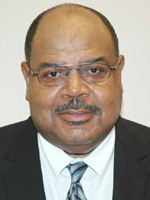 Razorback fans might remember Stoglin from the three years he spent as a basketball assistant under Nolan Richardson at the University of Arkansas. From 1989-2003, Stoglin was the men’s head coach at Jackson State University in Mississippi. He led the Tigers to six Southwestern Athletic Conference championships, three appearances in the NCAA Tournament and one NIT appearance. Stoglin was the SWAC Coach of the Year three times. His later career included two championships in Mexico’s top professional league and a year coaching the Arkansas Rimrockers, a professional team that played its home games at what’s now Verizon Arena in North Little Rock.
Razorback fans might remember Stoglin from the three years he spent as a basketball assistant under Nolan Richardson at the University of Arkansas. From 1989-2003, Stoglin was the men’s head coach at Jackson State University in Mississippi. He led the Tigers to six Southwestern Athletic Conference championships, three appearances in the NCAA Tournament and one NIT appearance. Stoglin was the SWAC Coach of the Year three times. His later career included two championships in Mexico’s top professional league and a year coaching the Arkansas Rimrockers, a professional team that played its home games at what’s now Verizon Arena in North Little Rock.
Stoglin stepped down after one season as head coach at MSCC but later took on the role of coach emeritus, using his extensive contacts in the world of basketball to benefit both the men’s and women’s teams.
“I’ve reached the point in my career where I want to give back and do something to help kids,” Stoglin says. “My goal for MSCC is to help make a difference in the lives of young men and women in our region.”
The athletic director and men’s head coach is Chris Parker, whose career before coming to MSCC in the fall of 2011 included stops as an assistant coach at Arkansas Tech, Houston Baptist, Texas Southern, Jackson State and Lubbock Christian. He was a head coach at the high school level for five years at Central Arkansas Christian.
The women’s head coach is Kimberly Ezell, who starred as a player at West Memphis High School, earning all-state recognition as a senior. She later played at Wabash Valley College, Hiwassee College and Coastal Carolina University.
Two years after starting the basketball program, MSCC moved from Division III to Division II. That allowed the school to offer tuition, fee and book scholarships.
“Participating in Division III was difficult because we couldn’t find enough Division III teams to play in our region,” Fenter says. “Our original intent was to play like-minded institutions, but those schools are not very close to us. We ended up traveling a long way in hopes of qualifying for the playoffs.
Fenter says scholarship money is raised privately.
“We want to make certain we’re taking care of the young people who live here,” he says. “There were a number of kids who were leaving primarily because somebody could offer them a small athletic scholarship. We’re now on an even playing field with those folks.”
At the start of last season, the MSCC Wellness Center opened. Known by students as the Dog House, it has seating for about 500 fans. It’s small but much more plush than what one usually finds at the junior college level. The floor has a two-tone parquet finish – think Boston Garden — and a giant greyhound head.
“From a coaching and recruiting perspective, it’s certainly a game changer,” Parker says. “It puts us on an entirely different level in terms of being able to attract some of the better student-athletes who are available each year. The floor looks great. It gives us something that most facilities in this area don’t have. And it may sound strange to the casual fan, but from a recruiting perspective, the locker rooms are huge.”
Ezell concurs: “Our locker rooms are like none other in two-year colleges. The lighting is really nice. It says a lot to current and future players about the level of commitment we have to our student-athletes.”
The top two scorers off the men’s team signed with four-year schools. T.J. Handley, who played high school basketball at Watson Chapel, is headed to the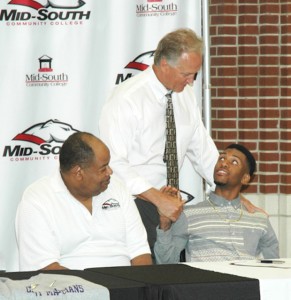 University of Arkansas at Pine Bluff. Jake Veasley, who played high school basketball for Cross County High School at Cherry Valley, is headed to Barton College in North Carolina. A Mid-South player from Memphis, Trevail Lee, signed with Montana State University-Northern, an NAIA school. From the women’s team, Rachell Hughes signed with LeMoyne-Owen College in Memphis.
University of Arkansas at Pine Bluff. Jake Veasley, who played high school basketball for Cross County High School at Cherry Valley, is headed to Barton College in North Carolina. A Mid-South player from Memphis, Trevail Lee, signed with Montana State University-Northern, an NAIA school. From the women’s team, Rachell Hughes signed with LeMoyne-Owen College in Memphis.
Recruiting has taken off with the new facility. Men’s signees this year include players from Little Rock Hall, England, Fort Smith Northside, Watson Chapel, Searcy, Forrest City and Monticello.
“You won’t see us on ESPN yet,” Fenter says. “You may not even hear much about us in the Memphis media. But our basketball program is making waves nonetheless. For many young people living in eastern Arkansas, athletics is an opportunity to continue to improve their options in life. The lessons they learn from competing with themselves and others to improve their athletic performance will serve them well throughout their lives. The way we keep score in our program is how many students we bring to our institution whose lives we can improve. That’s of ultimate importance. Nobody wants to win more than I do, but in our program winning games is a secondary function.”


